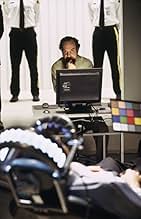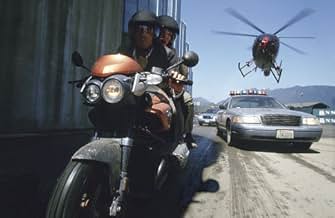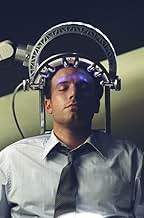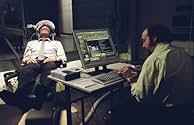Paycheck
- 2003
- Tous publics
- 1h 59m
A technical wizard learns that his memory has been erased.A technical wizard learns that his memory has been erased.A technical wizard learns that his memory has been erased.
- Awards
- 3 wins & 2 nominations total
Dee Jay Jackson
- Guard
- (as Deejay Jackson)
- Director
- Writers
- All cast & crew
- Production, box office & more at IMDbPro
Featured reviews
This movie questions playing god with technology. In this case, the technology provides the ability to forsee the future. Ben Affleck plays Michael Jennings, a pretty suave computer engineer who hires out to various technology companies seeking to improve their product. His work is so promising that they require that his memory be erased, I suppose, so as not to leak trade secrets. With the expectations of a lavish paycheck, Jennings is willing to give up three years of his life to work on a top secret project. Except, when the project is complete and the memory erased, he runs into the snag--being out of cash and on the run from a fleet of wild gunmen hired by the company.
It's a good story, and one reminscent of a good 50s episode of the Twilight Zone. You'll even notice some old noir camera effects such as Jennings staring into a mirror with the camera at a cocked angle as he tries to figure out his dilemma. The story is also reminscent of Memento, in that a person with no memory who has left himself clues must solve the mystery.
I was reluctant to find good in this movie before I had even seen it because of two reasons: Ben Affleck and John Woo. John Woo, though working with a good story, lays on thick those couple of minute action scenes with everyone coming so darn close (yet so far away) from getting their heads chopped off by flying cars and all that mess. It really wasn't pivotal to the story, nor to the mood, but understandably, it is the director's trademark. Ben Affleck was pretty much inconsequential in his role as Michael Jennings, playing the same charming nice guy character he always portrays in nearly every role he's been in. Uma Thurman, as Jennings girlfriend and Watson to Jenning's Sherlock, got some cheers from the theater, as most of her quick kung fu leg work and perfectly timed reactions manages to knock out a few of their armed adversaries.
But, despite the flack that Affleck gets, or misdirected Woo's (which is pretty much any John Woo film...at least according to Homer Simpson), this is a pretty good science fiction story. Especially, given that somewhat undermined, but valid, examination of the technology race and what it could mean for the future of mankind.
It's a good story, and one reminscent of a good 50s episode of the Twilight Zone. You'll even notice some old noir camera effects such as Jennings staring into a mirror with the camera at a cocked angle as he tries to figure out his dilemma. The story is also reminscent of Memento, in that a person with no memory who has left himself clues must solve the mystery.
I was reluctant to find good in this movie before I had even seen it because of two reasons: Ben Affleck and John Woo. John Woo, though working with a good story, lays on thick those couple of minute action scenes with everyone coming so darn close (yet so far away) from getting their heads chopped off by flying cars and all that mess. It really wasn't pivotal to the story, nor to the mood, but understandably, it is the director's trademark. Ben Affleck was pretty much inconsequential in his role as Michael Jennings, playing the same charming nice guy character he always portrays in nearly every role he's been in. Uma Thurman, as Jennings girlfriend and Watson to Jenning's Sherlock, got some cheers from the theater, as most of her quick kung fu leg work and perfectly timed reactions manages to knock out a few of their armed adversaries.
But, despite the flack that Affleck gets, or misdirected Woo's (which is pretty much any John Woo film...at least according to Homer Simpson), this is a pretty good science fiction story. Especially, given that somewhat undermined, but valid, examination of the technology race and what it could mean for the future of mankind.
Rating: ** out of ****
I wonder what it says about the state of cinematic science fiction that most of author Philip K. Dick's adaptations generally mix high-octane action with its interesting sci-fi concepts. Paycheck is no exception, hardly a surprise when you note it's from once beloved Hong Kong filmmaker John Woo, who's quickly reaching Michael Bay/Roland Emmerich levels of notoriety in the U.S. with each regressive film.
To be fair, Paycheck isn't unenjoyable, and it even gets off to a pretty good start. Set sometime in the near future, there's not much of a noticeable difference with our present time except for a few elaborate-looking gadgets and computers. Ben Affleck stars as Michael Jennings, a reverse engineer who's hired by major corporations to build products superior to all rival companies. Afterwards, his memory is erased by a partner of his (Paul Giamatti) and he's given a large paycheck for his time and troubles (usually the whole process takes about three months).
His latest offer comes from an old friend of his (Aaron Eckhart), who promises an eight-figure deal at the end of the transaction. The catch is that the whole procedure will take three years. Despite some reluctance, he agrees to the deal and when the three years pass by, Jennings, thinking he's a rich man, is shocked to discover he gave up over ninety million dollars in favor of an envelope containing twenty everyday household items. Now he finds himself on the run from both the FBI and the company that hired him, and must set out to discover what he built during those three years he's missing.
Uma Thurman also stars in the movie as Jennings' girlfriend during that three-year span, but she factors so lazily into the picture, she's obviously only in the film so that a) Jennings can have a love interest and b) he can also have someone to talk to about every little discovery he makes. Then again, function "b" could have worked just as well with Giamatti, but everyone knows a "sexy" chick is a better sell (I have to put quote marks around sexy because Thurman looks positively haggard for almost every minute of screen time she's present; I can't help but feel the much hotter Kathryn Morris would have done better in the role).
There are two concepts in this movie that specifically intrigue me (some moderate spoilers here), the first one is choosing deliberately to erase your own memory, but the notion is forgotten after the first half-hour. I was quite curious to know exactly what the process is like to the subject. Take, for instance, the fact that he lost his memory over the three-year span. Does the last thing he remembers feel like a three-year old memory or an event that happened just a second ago? Instead, all we get is a half-hearted (actually, not even that much) attempt at a sorrowful romance because he can't remember his girlfriend and she's not very happy about that.
The other major sci-fi concept, the ability to see into the future, isn't explored with much more interest and it leads to a number of baffling questions. You see (quite a few spoilers here), it's revealed Jennings sent himself those twenty items because they can come in handy at a specific moment that'll help him survive or escape from a dangerous situation.
But the thing is, Jennings couldn't have known each item would come in handy unless he used the device he built at least twenty times, because there's no way he'd know a motorcycle would come in handy if he never had, say, the bus ticket to escape from the FBI, meaning he used the device to see what he needed to escape the FBI, but still foresaw that he'd be killed in even more future events. That would mean this guy was originally destined to die or get caught in well over ten different scenarios (i.e. he had the bus ticket to escape, but if he didn't have the motorbike keys, he wouldn't have gotten further, and so on and so forth), but this is never really addressed.
By John Woo standards, there's surprisingly only a modest amount of action in the film, but at least the material is competently handled, even if it's not entirely believable. What might work in movies that establish their characters as supercops with impeccable aims doesn't come off quite as well in action scenes that feature scientists beating up a large number of armed goons. But if you suspend disbelief, the action scenes are pretty fun (especially the motorcycle chase and the laboratory battle), and coupled with the relatively fast pace, keep the movie perfectly watchable despite the poor script and mediocre acting (I never got into specifics, but this is Ben Affleck and Uma Thurman we're talking about).
When all is said and done, Paycheck is a wasted opportunity and is never as memorable a mixture of science fiction, mystery, and action as Minority Report, but it's likely to do the trick for undemanding fans of any of these genres. If you expect more, well, you'd do best to remember this is John Woo we're talking about, not Steven Spielberg.
I wonder what it says about the state of cinematic science fiction that most of author Philip K. Dick's adaptations generally mix high-octane action with its interesting sci-fi concepts. Paycheck is no exception, hardly a surprise when you note it's from once beloved Hong Kong filmmaker John Woo, who's quickly reaching Michael Bay/Roland Emmerich levels of notoriety in the U.S. with each regressive film.
To be fair, Paycheck isn't unenjoyable, and it even gets off to a pretty good start. Set sometime in the near future, there's not much of a noticeable difference with our present time except for a few elaborate-looking gadgets and computers. Ben Affleck stars as Michael Jennings, a reverse engineer who's hired by major corporations to build products superior to all rival companies. Afterwards, his memory is erased by a partner of his (Paul Giamatti) and he's given a large paycheck for his time and troubles (usually the whole process takes about three months).
His latest offer comes from an old friend of his (Aaron Eckhart), who promises an eight-figure deal at the end of the transaction. The catch is that the whole procedure will take three years. Despite some reluctance, he agrees to the deal and when the three years pass by, Jennings, thinking he's a rich man, is shocked to discover he gave up over ninety million dollars in favor of an envelope containing twenty everyday household items. Now he finds himself on the run from both the FBI and the company that hired him, and must set out to discover what he built during those three years he's missing.
Uma Thurman also stars in the movie as Jennings' girlfriend during that three-year span, but she factors so lazily into the picture, she's obviously only in the film so that a) Jennings can have a love interest and b) he can also have someone to talk to about every little discovery he makes. Then again, function "b" could have worked just as well with Giamatti, but everyone knows a "sexy" chick is a better sell (I have to put quote marks around sexy because Thurman looks positively haggard for almost every minute of screen time she's present; I can't help but feel the much hotter Kathryn Morris would have done better in the role).
There are two concepts in this movie that specifically intrigue me (some moderate spoilers here), the first one is choosing deliberately to erase your own memory, but the notion is forgotten after the first half-hour. I was quite curious to know exactly what the process is like to the subject. Take, for instance, the fact that he lost his memory over the three-year span. Does the last thing he remembers feel like a three-year old memory or an event that happened just a second ago? Instead, all we get is a half-hearted (actually, not even that much) attempt at a sorrowful romance because he can't remember his girlfriend and she's not very happy about that.
The other major sci-fi concept, the ability to see into the future, isn't explored with much more interest and it leads to a number of baffling questions. You see (quite a few spoilers here), it's revealed Jennings sent himself those twenty items because they can come in handy at a specific moment that'll help him survive or escape from a dangerous situation.
But the thing is, Jennings couldn't have known each item would come in handy unless he used the device he built at least twenty times, because there's no way he'd know a motorcycle would come in handy if he never had, say, the bus ticket to escape from the FBI, meaning he used the device to see what he needed to escape the FBI, but still foresaw that he'd be killed in even more future events. That would mean this guy was originally destined to die or get caught in well over ten different scenarios (i.e. he had the bus ticket to escape, but if he didn't have the motorbike keys, he wouldn't have gotten further, and so on and so forth), but this is never really addressed.
By John Woo standards, there's surprisingly only a modest amount of action in the film, but at least the material is competently handled, even if it's not entirely believable. What might work in movies that establish their characters as supercops with impeccable aims doesn't come off quite as well in action scenes that feature scientists beating up a large number of armed goons. But if you suspend disbelief, the action scenes are pretty fun (especially the motorcycle chase and the laboratory battle), and coupled with the relatively fast pace, keep the movie perfectly watchable despite the poor script and mediocre acting (I never got into specifics, but this is Ben Affleck and Uma Thurman we're talking about).
When all is said and done, Paycheck is a wasted opportunity and is never as memorable a mixture of science fiction, mystery, and action as Minority Report, but it's likely to do the trick for undemanding fans of any of these genres. If you expect more, well, you'd do best to remember this is John Woo we're talking about, not Steven Spielberg.
'Paycheck' is an action thriller with some amazing action sequences in the vain of the 'Bourne' films.
Ben Affleck stars as a brilliant computer engineer, Jennings, who must analyze a computer for a rival company. Once done, his memory for the time period it took him to do the job, is erased. His good billionaire friend, Rethrick, then offers him a job that could last up to three years. When Jennings accepts, the film jumps ahead three years, leaving the viewer wondering what the hell he did.
The plot then thickens when Jennings is told he forfeited his share, and is given an envelope with everyday items instead. Jennings then finds himself in a cat and mouse game on the run from the company - and Rethrick - he worked for. With only the contents of the envelope to unravel the mystery, the film is an interesting concept, and the viewer unravels it together with Jennings.
Uma Thurman serves as the film's love interest, Rachel.
'Paycheck' has a great production design and great action sequences and visuals. Although not always believable, it was a lot of fun! This was highly entertaining!
Ben Affleck stars as a brilliant computer engineer, Jennings, who must analyze a computer for a rival company. Once done, his memory for the time period it took him to do the job, is erased. His good billionaire friend, Rethrick, then offers him a job that could last up to three years. When Jennings accepts, the film jumps ahead three years, leaving the viewer wondering what the hell he did.
The plot then thickens when Jennings is told he forfeited his share, and is given an envelope with everyday items instead. Jennings then finds himself in a cat and mouse game on the run from the company - and Rethrick - he worked for. With only the contents of the envelope to unravel the mystery, the film is an interesting concept, and the viewer unravels it together with Jennings.
Uma Thurman serves as the film's love interest, Rachel.
'Paycheck' has a great production design and great action sequences and visuals. Although not always believable, it was a lot of fun! This was highly entertaining!
Philip K. Dick would be furious if he saw this latest adaptation of one of his stories. Things that shouldn't be explained are (e.g. the future machine sees into the future with a really powerful lens that can see around the curvature of the universe... THEN HOW DOES IT SEE INTO BUILDINGS?). Things that need explanations (like why people don't pull the trigger when they have a gun pointed at their enemy) don't get explained, probably because there is no rational explanation.
Every cliche in the book is on display here. The jocular banter between people is as bad as any 70's cop show. The action sequences are tired and overblown. In one ridiculous scene, just before the protagonist is set to die, a dove flies in through the door leaving the audience to wonder WHAT IN BLUE BLAZES?!?!?!
Hardly any of the main characters come off well. Uma Thurman looks about 50 years old for some reason. Ben Affleck can't act as usual. The scientist from Terminator 2 is in this playing some kind of bad-guy good-guy or something. I didn't bother thinking too hard about it.
The sad part is, I could see the brilliance of Philip K. Dicks story poking through the garbage once in a while. The premise is ingenious, but unfortunately every time it peeps its head out, John Woo takes a massive dump on it.
Every cliche in the book is on display here. The jocular banter between people is as bad as any 70's cop show. The action sequences are tired and overblown. In one ridiculous scene, just before the protagonist is set to die, a dove flies in through the door leaving the audience to wonder WHAT IN BLUE BLAZES?!?!?!
Hardly any of the main characters come off well. Uma Thurman looks about 50 years old for some reason. Ben Affleck can't act as usual. The scientist from Terminator 2 is in this playing some kind of bad-guy good-guy or something. I didn't bother thinking too hard about it.
The sad part is, I could see the brilliance of Philip K. Dicks story poking through the garbage once in a while. The premise is ingenious, but unfortunately every time it peeps its head out, John Woo takes a massive dump on it.
Philip K Dick wrote many stories which seemed to have great film potential. I never thought of this as one of them.
I have seen Ben Affleck in a number of films, and felt that he was good in a few, OK in most, and positively annoying in some.
I saw the horrible, misleading trailers.
The soundtrack was simply bad.
So, needless to say, I went into Paycheck with very low expectations.... and I was pleasantly surprised.
Affleck plays a talented reverse-engineer, who sees the possibilities in new technology, and is able to carry it through to fruition. He takes on top-secret jobs and has his memory erased upon the completion of each. He decides to take on a project big and profitable enough to allow him to retire comfortably for the rest of his life. He completes the project, goes through the memory erasure, and then starts to discover what he has done, and, pursued by corporate hit men and the police, tries to recover his memory. Uma Thurmond, a biologist he had fallen in love with, is one of the memories he wants to recover, and also a target.
Paycheck is more of an action film than a sci fi flick. The plot serves the action, as do the somewhat one-dimensional characters. And there is so little chemistry between Affleck and Thurmond that the romantic subplot is almost just a distraction. Despite these flaws, I spent an evening being thoroughly entertained by this rehashing of the usual technology-run-amok / knowledge-is-power story. This film is very Hollywood, and uses a lot of slick and clichéd camera-work, but nevertheless tells a good story and does it well enough.
I have seen Ben Affleck in a number of films, and felt that he was good in a few, OK in most, and positively annoying in some.
I saw the horrible, misleading trailers.
The soundtrack was simply bad.
So, needless to say, I went into Paycheck with very low expectations.... and I was pleasantly surprised.
Affleck plays a talented reverse-engineer, who sees the possibilities in new technology, and is able to carry it through to fruition. He takes on top-secret jobs and has his memory erased upon the completion of each. He decides to take on a project big and profitable enough to allow him to retire comfortably for the rest of his life. He completes the project, goes through the memory erasure, and then starts to discover what he has done, and, pursued by corporate hit men and the police, tries to recover his memory. Uma Thurmond, a biologist he had fallen in love with, is one of the memories he wants to recover, and also a target.
Paycheck is more of an action film than a sci fi flick. The plot serves the action, as do the somewhat one-dimensional characters. And there is so little chemistry between Affleck and Thurmond that the romantic subplot is almost just a distraction. Despite these flaws, I spent an evening being thoroughly entertained by this rehashing of the usual technology-run-amok / knowledge-is-power story. This film is very Hollywood, and uses a lot of slick and clichéd camera-work, but nevertheless tells a good story and does it well enough.
Did you know
- TriviaThis was Ben Affleck's biggest paycheck to date, earning him approximately $15 million. Whenever he's asked to why he starred in the film, he responds "The answer lies in the title".
- GoofsThe "checkpoint" from where Michael's memory was supposed to be erased after finishing his first job is shown in a monitor as him walking with the box under his arm. However, he wouldn't have this image in his brain, but instead one from his own point of view.
- Quotes
Michael Jennings: [quoting from a fortune cookie strip] If you only look where you can't go, you will miss the riches below.
- ConnectionsEdited into Paycheck: Deleted/Extended Scenes (2004)
- SoundtracksMinute Waltz in D Flat Major Op. 64 No. 1
by Frédéric Chopin
Performed by Lincoln Mayorga
Courtesy of Townhall Records
- How long is Paycheck?Powered by Alexa
- Is this film based on a novel?
Details
- Release date
- Countries of origin
- Language
- Also known as
- El Pago
- Filming locations
- Production companies
- See more company credits at IMDbPro
Box office
- Budget
- $60,000,000 (estimated)
- Gross US & Canada
- $53,790,451
- Opening weekend US & Canada
- $13,462,374
- Dec 28, 2003
- Gross worldwide
- $117,248,958
- Runtime1 hour 59 minutes
- Color
- Sound mix
- Aspect ratio
- 2.39 : 1
Contribute to this page
Suggest an edit or add missing content





































